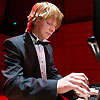Chris Bourke interview - Page 8
Chris: Ross Harris also said - it doesn't matter if it's conscious or un-conscious.
Douglas: Well I wrote a brief note back to Canzona and said this is ridiculous and the fact that I use a three note theme spanning four notes is a way of avoiding a triad later on. And the fact that it bears any resemblance to "Sings Harry", you might as well say that Beethoven was making a reference to Napoleon every time he wrote an E flat triad. Which is absurd.
Chris: Here's the quote: "Whether the composer intended it or not, sub-consciously or consciously, the influence can still be there"
Douglas: Well, his guess is as good as mine, but I had one of his students come up to me after a performance in the music room, "My word Mr Lilburn" she said "that was very interesting. You write pastoral music, don't you? You were a pupil of Vaughan Williams weren't you" and I knew right away where she got all that from, so I teased Ross about this later and he had the grace to blush I must say.
Chris: That Canzona analysis business is a bit esoteric for our readers.
Douglas: Yes, but these people judge everything in terms of pitch relationships - I think that is nonsensical. My main response is always to the rhythmical thing and the span of the rhythmical thing, the energy of it, and if that is alive it doesn't matter what notes you have, it'll still get through.
Chris: All part of communicating which is the whole point.
Douglas: Yes it's the vitality of it.
Chris: Ross [Harris] once talked to me of the pressure on a composer from society to write a symphony.
Douglas: I think this is a slightly romantic idea isn't it - true of 1880 not 1980.
Chris: Is this what led to first and second symphonies.
Douglas: No - the opening of the "First Symphony" just came to me on the Port Hills one day and I thought 'that is the start of a symphony' and the rest of it came bit by bit - once you've got something with that core of energy other things use it as a catalyst according to appropriate imagined groups around it, and out of that suddenly one day you get a sense of form, the thing that Mozart said came to him in a flash. I think it was much easier for Mozart because he was using familiar harmonies and key schemes.
Chris: You would also want to experiment with the symphonic form just to make use of the orchestra.
Douglas: I don't think I'm conscious of trying to experiment with the symphonic form at all, I just followed my nose in a slightly erratic way, slightly erratic because I didn't have very great technical training, I only had this quite rudimentary training at Canterbury College before I went overseas to London, and I only had two-and-a-half years in London. Put that against what most people would get - ten or twelve years.
Chris: Working in dark.
Douglas: Not really - intuition that's all - I simply wasn't interested in a lot of things that the symphonic technique can do, what is called development of material, just seemed a played out game.
Chris: You've brought up the idea that a theme comes to you and you think well that has to be a symphony.
Douglas: It's the germ of a symphony, what Beethoven used to call a 'Bild'. He used to put these down in his notebook and they mightn't bear any resemblance to any final product except that they carried the energy.
Chris: You're composing to say something rather than to stretch yourself.
Douglas: I think you could call it an inner compulsion, put this on the psychiatric couch and it might be a way of saying to my family, well I may be no good as a farmer but I'm all right as a composer. This may be part of it too. Its very easy to put labels on things and think you understand them - you don't, you just suppress your understanding once you put that label on something.
Chris: I'm really getting at why you got into serialism.
Douglas: Well, I got the impression that I was becoming pretty old-fashioned through being isolated out here for so long
Chris: One has to keep pushing the barriers.
Douglas: Sure.
Chris: To be relevant to the time.
Douglas: Well, one's time and place perhaps, but no times or places are the same.









